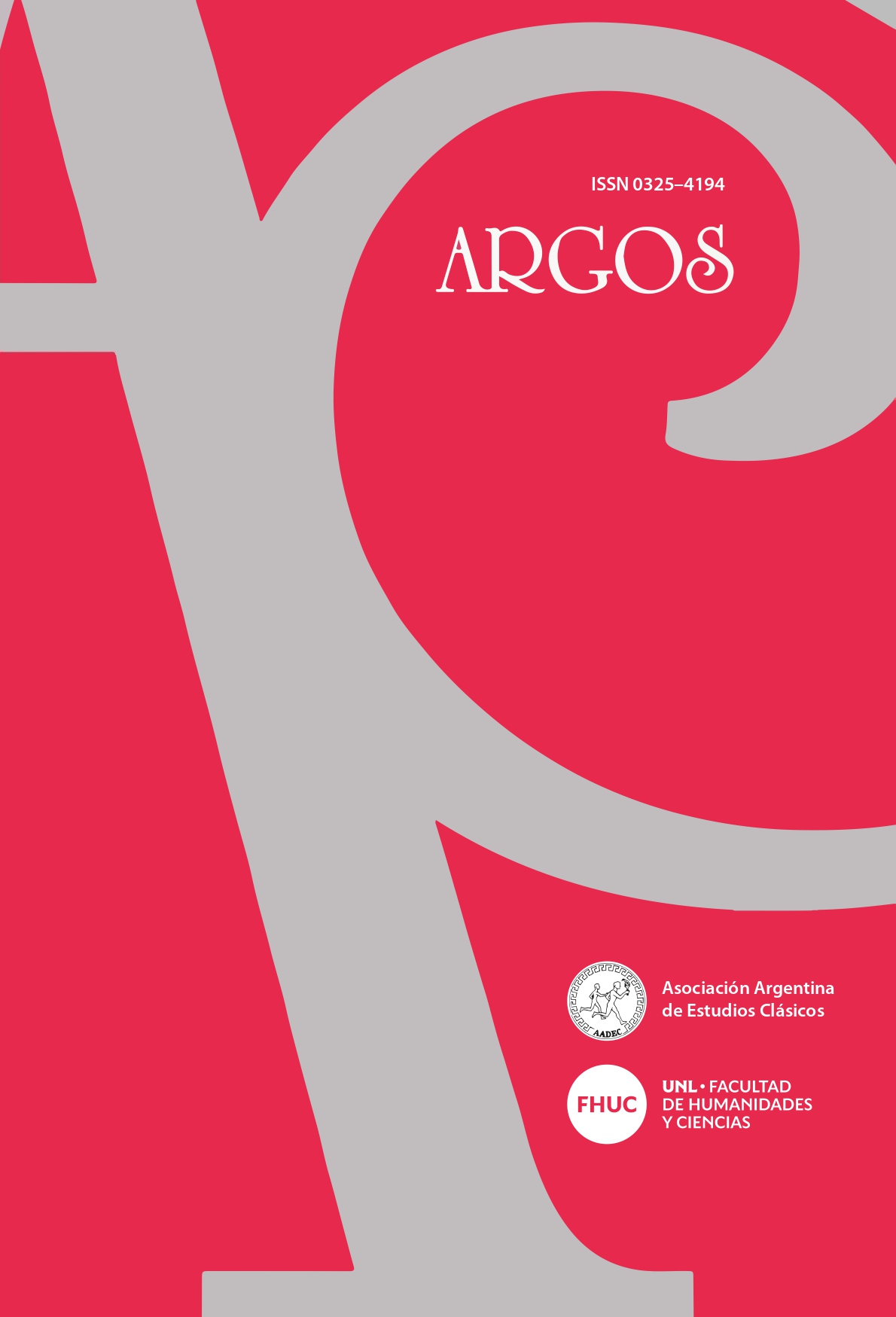Notas en torno del origen del lenguaje en Epicuro
DOI:
https://doi.org/10.14409/argos.2023.49.e0051Keywords:
linguistic conventionalism, linguistic naturalism, epicureanism, origin of language, linguistic articulationAbstract
This paper presents a critical and hermeneutic analysis of Epicurus' thesis about the origin of language as stated in his single brief testimony, consisting of two paragraphs from his Letter to Herodotus. This analysis reveals the markedly problematic character of the theorisation, which does not seem to contain a proper explanation on the origin of language. By means of a theoretical reconstruction of the process underlying Epicurus' statement and on the basis of a comparison with the classical perspective of language (Platonic and Aristotelian), the main gaps in the thesis under analysis are pointed out.
References
Bibliografía
Fuentes
DK = DIELS, H., KRANZ, W. (1968). Fragmente der Vorsokratiker. Weidemann.
Diógenes de Enoanda = SMITH, Martin F. (1970), Fragments of Diogenes of Oenoanda discovered and rediscovered, American Journal of Archeology 74, 51-62.
Proclo = Procli Scholia in Cratylum Platonis Excerpta (1820). Ed. J. Fr. BOISSONADE. Leiden.
Epicuro, Epístola a Heródoto = VON DER MÜHLL, P. (1922). Epicuri Epistulae tres et ratae sententiae a Laertio Diogene servatae, Teubner.
Estudios
ATHERTON, C. (2005). Stoics and Epicureans on Language and the World. The Routledge Handbook of Hellenistic Philosophy, 114-129.
AX, W. (1986). Laut, Stimme und Sprache. Studien zu drei Grundbegriffen der antiken Sprachtheorie. Vanderhoeck und Ruprecht
AX, W. (1978). Ψóφος, φωνή und διάλεκτος als Grundbegriffe aristotelischer Sprachreflexion. Glotta (xxxvii), 241-271.
COLE, T. (1967). Democritus and the Sources of Greek Anthropology. Philological Monographs of the American Philological Association 25, xii+225.
CHILTON, C. W. (1962). The Epicurean Theory of the Origin of Language. A Study of Diogenes of Oenoanda, Fragments X and XI. The American Journal of Philology, 83 (2), 159-167.
DE LACY, P.H. (1939). The Epicurean Analysis of Languagea. AJP 60, 85-92.
EVERSON, S. (2008). Epicurean psychology. En Algra, K., Barnes, J., Mansfeld, J. & Schofield, M. (Eds.). The Cambridge History of Hellenisc Philosophy. Cambridge University Press.
EVERSON, S. (1994). Epicurus on mind and language, en Everson, S. (Ed.). Language. Companions to Ancient Thought, 3. Cambridge.
GIUSSANI, C. (1896). T. Lucreti Cari De rerum natura libri sex. 1. Studi Lucreziani. Loescher.
GLIDDEN, D.K. (1984). Prolepsis in Peri physeos XXVIII fr. 12, III, 3-14. En AA.VV. Atti del xvii Congresso internazionale di papirologia, pp. 399-404. Centro Internazionale per lo Studio dei Papiri di Ercolano.
GLIDDEN, D. K. (1983). Epicurean Semantics. En: ΣΥΖΗΤΗΣΙΣ: Studi sull' Epicureismo Greco e Romano Offerti a Marcello Gigante, Vol. 1. 185-226. Macchiaroli.
HOLMES, B. (2005). Daedala Lingua: Crafted Speech in ‘De Rerum Natura’. AJP 126 (4), 527-585.
LONG, A. (1971). Aisthesis, Prolepsis and Linguistic Theory in Epicurus. Bulletin of Classical Studies 18 (1), 144-155.
LONG, A. & SEDLEY, D. (1989). The hellenistic philosophers, 2. Cambridge University Press.
LONG, A. & SEDLEY, D. (1982). The Hellenistic Philosophers, 1. Cambridge University Press.
MACKEY, J. (2015). New Evidence for the Epicurean Theory of the Origin of Language: Filodemus, On Poems V (P Herc. 403, fr. 5, col. I). Cronache Ercolanesi 45, 67-84.
MÜLLER, R. (2003). Konzeptionen des Sprachwaldels in der Antike. Hermes 131 (2), 196-221.
REINHARDT, T. (2008). Epicurus and Lucretius on the Origins of Language. CQ 58 (1), 127-140.
ROBINSON, R. (1969). Essays in Greek Philosophy. Clarendon Press.
SCHRIJVERS, P.H. (1970). La pensée de Lucrèce sur l’origine du langage. Mnemosýne 4 (27), 334-364.
SEDLEY, D. (1973). Epicurus, On Nature, Book XXVIII. Cronache Ercolanesi 3, 4-83.
SINNOTT, E. (2003). El naturalismo lingüístico de los estoicos y sus fuentes platónicas. Stylos xii, 137-160.
SINNOTT, E. (2021). Variedades del convencionalismo y del naturalismo en la reflexión antigua acerca del lenguaje. Circe de clásicos y modernos 25 (2), 85-103.
SINNOTT, E. (2017). Acerca de las letras y los elementos fónicos en Aristóteles. Stromata 73, 31-56.
SINNOTT, E. (2014). San Agustín, El Maestro. Introducción, pp. vii-xcviii. Colihue.
SINNOTT, E. (2004). El convencionalismo lingüístico en Aristóteles. Cuadernos del Sur 33, 37-55.
SMITH, M. F. (1993). Diogenes of Oinoanda. The Epicurean Inscriptio. La Scuola di Epicuro. Supplemento 1.
VERLINSKY, A. (2005). Epicurus and his Predecessors on the Origin of Language. En Frede, D. & Inwood, B. (Eds.). Language and Learning. Philosophy of Language in the Hellenistic Age, 14-35. Cambridge Univesity Press.
Instrumenta
BAILLY, A. (1976). Dictionnaire grec–français. Hachette.
LIDDEL, H.G. & SCOTT, R. (2007). A Greek-English Lexicon. Clarendon.
Downloads
Published
How to Cite
Issue
Section
License
Copyright (c) 2024 Argos

This work is licensed under a Creative Commons Attribution-NonCommercial-ShareAlike 4.0 International License.



